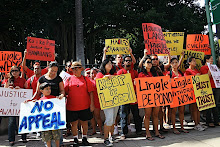In today's Honolulu Advertiser, retired Kailua High School teacher, Lawrence Araki has an editorial. Mr. Araki responds to a previous column written by the Advertiser's David Shapiro. Shapiro is recognized by readers to take the moral high ground in many of his columns. In his December 10 column, Shapiro seemed to not take that high ground and Mr. Araki wrote about it.
Ceded land stance ignores moral obligation
By Lawrence K. Araki
In reading David Shapiro's Dec. 10 column, "Lingle's stance on ceded lands is justified," I was struck by how convincing, rational and well thought out his piece was from a pragmatic, legalistic perspective. However, it was missing something: moral obligation. It is a value that parents teach in various forms from a child's earliest days. Without that sense of moral obligation, justice is diminished, compassion and understanding are weakened and our basic humanity is lessened.
Laws and legal systems are created by societies to provide justice in resolving disputes. Justice is usually seen as striking an amenable balance between law and moral obligation, particularly in correcting situations where a "strong moral claim" has been inadequately addressed or ignored.
Historically when indigenous peoples have had dealings with the legal system, any fulfillment of moral obligation to their claims (usually historical and based on the broken promises of the dominant society) has with rare exception come in last to the legal claims of the larger society.
A critical component of the Lingle administration's appeal of the Hawai'i Supreme Court decision regarding ceded lands is the contention that Native Hawaiians do not have a legal claim to the ceded lands. Not surprisingly it is this contention that Native Hawaiians find immoral and are concerned will open the door to further attempts to erode whatever moral obligations remain.
Is this just? As Americans we see ourselves as having a strong sense of moral obligation — "just doing the right thing" (it justifies the good and bad we do in the world via our foreign policy) — yet we also have a strong tolerance for ignoring moral obligation when it doesn't meet our needs or suit our interests (see foreign policy).
Our current economic crisis illustrates what can happen when we allow moral obligation to be ignored. It is an example that strikes closer to home for those of us who are not of indigenous heritage.
The bailout of banks and the auto industry is justified by the argument that we are serving the greater good of society. Yet it is the failure of the leaders of these institutions, who operated within the law, to fulfill their moral obligation to their employees, shareholders and a largely ignored obligation to the larger society that have brought all of us to these circumstances.
Their greed and blind drive for profit created an eagerness to embrace expediency over anything but lip service to moral obligation. Do we continue to emulate a model of leadership that has so clearly failed the vast majority? Do we teach that model of leadership to our children?
It is often said that the measure of a society is how it treats its most vulnerable members. The legacy of Native Hawaiians is a history and culture so unique and attractive that we market ourselves as the "Aloha State" with all the mystique and good will that that encompasses. It is also true that like so many indigenous peoples, Native Hawaiians have disproportionately high rates of certain diseases, homelessness and imprisonment.
The point is that the resolution of the ceded lands claim is a measure of how we in Hawai'i respond when faced with the opportunity to fulfill a large and longstanding moral obligation while dealing with the pressures of immediate economic demands. Do we perpetuate past injustices in the guise of doing what is best for the state or do we pursue a path where we do the right thing and fulfill our moral obligations? And, in the long run, which of these lessons do we want to teach our children?
Lawrence K. Araki is a retired Kailua High School teacher.
The Honolulu Star-Bulletin has a letter to the editor written by Rodney Ferreira from Kamuela, Hawai'i. In his letter, he describes Governor Linda Lingle, as politician, having come "full-circle." Mr. Ferreira also calls upon Lt. Governor "Duke" Aiona to make his position on the ceded lands known.
Governor going back on ceded lands
Gov. Linda Lingle's newfound position that the Hawaiian people have no stake in ceded lands is a complete rejection of all that she promised Hawaiians. One can safely say that her political career has come full circle -- a promising career based on honesty and integrity destroyed by political correctness and blind ambition.
The question now becomes one of conscience for Lt. Gov. "Duke" Aiona. Does he seek higher office or sink with the Lingle ship?
Aiona, a Hawaiian, needs to take a position on ceded lands separate from Lingle and announce what his position on ceded lands is if he expects to maintain any political viability in the future.
He needs to do that now!
MAHALO to both Mr. Araki and Mr. Ferreira for their comments!
Thursday, December 18, 2008
Subscribe to:
Post Comments (Atom)




No comments:
Post a Comment